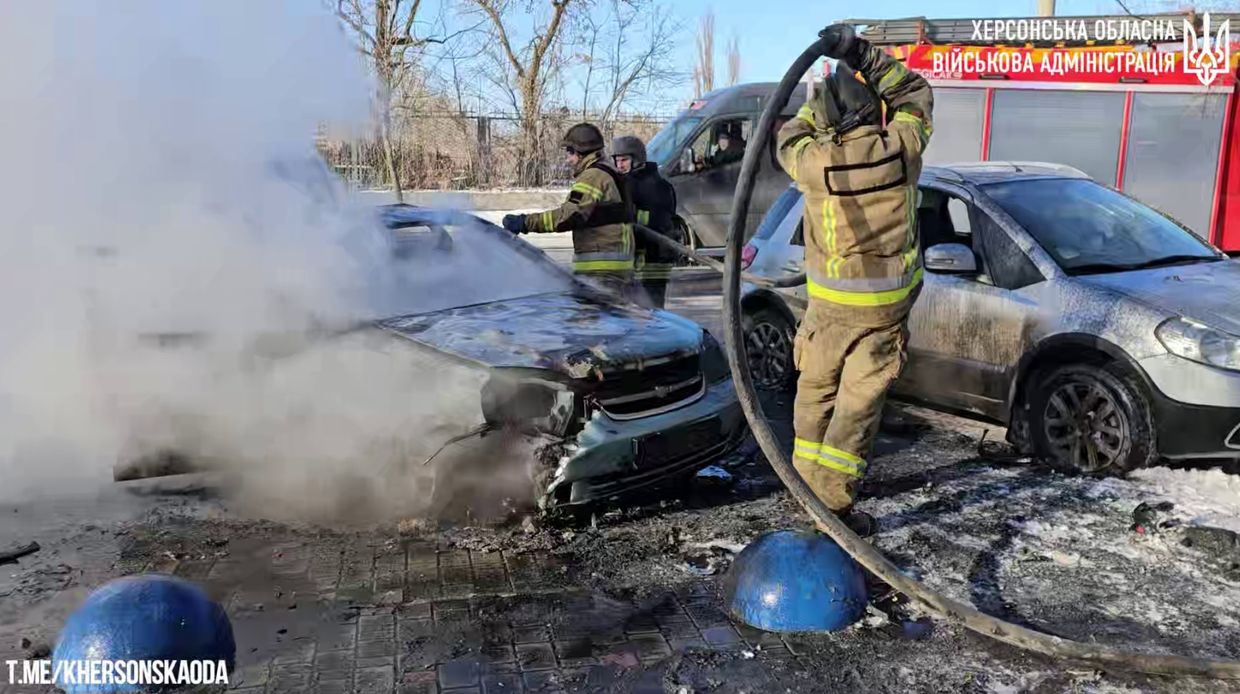Daily Flyer - January 12, 2024
A voice of Ukraine to the West

Russian shelling of Kherson kills 2 civilians

Russian forces launched an artillery strike against Kherson on Jan. 12, killing at least two people, Governor Oleksandr Prokudin reported. The attack took place at around 12 p.m., targeting streets of the city's Korabel district, said Roman Mrochko, the head of Kherson's military administration. The victims include an 80-year-old woman and a driver of a car whose identity is being determined, according to officials. No further details were provided at the moment. Ukraine's Armed Forces liberated Kherson and other regional settlements on the western bank of the Dnipro River in November 2022. Russian troops were pushed to the eastern bank, from where they have since been firing at the liberated territories, regularly resulting in civilian deaths and injuries. Over the past day, Russian attacks against Kherson Oblast killed one resident and injured three, Prokudin said in his morning report on Jan. 12.
Russia lacks some modern weapon parts due to sanctions
Military Intelligence spokesperson Andrii Yusov revealed on Jan. 12 that Russia is experiencing shortages in weapon components such as modern optics and electronics due to international trade restrictions. Despite efforts to obtain sanctioned goods through various means, Yusov emphasized that sanctions have created complications for Russia, particularly in acquiring modern optics, electronics, and microchips.
Yusov mentioned that Moscow is attempting to establish "gray import schemes" to smuggle in the necessary equipment, highlighting Russia's status as one of the world's leading countries involved in smuggling. Despite these challenges, Yusov acknowledged that Russia still possesses the old Soviet technological base and has the capability to modernize existing projects.
In a comment to the French newspaper Le Monde, HUR chief Kyrylo Budanov suggested that Russia may have increased ammunition production since the summer of 2023. However, this has reportedly come at the cost of munitions' quality, negatively impacting factors like accuracy.
The context provided indicates that, following the outbreak of a full-scale war, Western countries imposed extensive sanctions on Russia, including bans on imports crucial for the production of high-tech weapons. Despite these sanctions, Moscow has been obtaining dual-use goods through third-party countries like Kazakhstan, Turkey, or China.
Ukraine's National Agency on Corruption Prevention (NAZK) identified around 2,500 foreign components in Russian weaponry, mostly from U.S. producers who do not sell their products directly to Russia. In response to such circumvention, Kyiv's allies, including the EU, have implemented measures to restrict third-country entities from re-exporting sensitive goods to Russia as part of their latest sanction packages.
Majority of Russians see war in Ukraine as 'civilizational struggle with West'
In the heart of Russia, a recent poll conducted by the University of Chicago's National Opinion Research Center (NORC) unveiled intriguing insights into the minds of its citizens. Against the backdrop of a conflict that has gripped the nation for nearly two years, the results painted a tapestry of emotions and perspectives.
The story began with a revelation: 63% of Russians stood steadfast in their support for the full-scale war against Ukraine. It was a sentiment that, while slightly diminished from a poll just a few months prior, echoed the resilience of a nation navigating the complexities of international affairs.
As the plot unfolded, the narrative revealed a curious dynamic — a parallel reality where 64% of respondents viewed the conflict not just as a territorial struggle but as a larger "civilizational struggle between Russia and the West." The themes of identity, pride, and a clash of values were becoming apparent.
Amid the geopolitical drama, economic concerns took center stage. For 55% of those surveyed, financial worries cast a shadow over their daily lives. Yet, paradoxically, 65% attributed rising prices to a decline in their own economic circumstances. The economic subplot seemed intertwined with the larger narrative of war and its impact on the lives of ordinary Russians.
In the midst of global isolation, efforts to curb Russia's influence through sanctions went largely unnoticed by the majority. A staggering 76% claimed unaffected status, a testament to the resilience or perhaps the isolationist tendencies of a nation entrenched in its own struggles.
Then, as the storyline approached a political climax, the upcoming presidential election loomed large. With President Vladimir Putin seeking a fifth term, 66% of respondents expressed their inclination to cast their vote in his favor. A generational divide added nuance to this political subplot, with older generations contributing significantly to the protagonist's popularity.
Amidst the tumult, a consistent thread emerged — a resolute pride in Russian identity. An overwhelming 94% expressed at least a moderate level of pride in being Russian, underscoring a sense of unity and shared heritage. Concurrently, a belief held by 62% that Russia was treated unfairly in the global arena added a layer of perceived injustice to the tale.
The story's climax was marked by concerns about "Western influences," particularly on traditional values. Sixty-eight percent expressed worry that elements such as LGBTQ issues could impact the cultural fabric of Russia. It echoed a theme often amplified by President Putin, who framed the war on civilizational terms and used perceived threats to rally domestic support.
In this multifaceted narrative of pride, conflict, economic woes, and political allegiance, the characters — the people of Russia — grappled with their reality, each playing a role in a story still unfolding against the backdrop of international turmoil.
Kremlin using coal subsidies to force Russian passports on residents in occupied Kherson Oblast
In the occupied Kherson Oblast, authorities installed by Moscow are reportedly offering coal subsidies for heating, but with a condition: the subsidies are only available to residents who have become Russian citizens, according to information from the Ukrainian military's National Resistance Center.
As part of Russia's strategy of forced passportization, special incentives are being provided to residents in the occupied Ukrainian territory who adopt Russian passports. Simultaneously, those Ukrainians who resist taking Russian citizenship face threats of deportation or being forcibly mobilized into the Russian military.
Amid freezing temperatures and power shortages in multiple settlements of the occupied Kherson Oblast, the need for coal has increased. However, the National Resistance Center, operated by Ukraine's special forces, claims that Russia is cynically utilizing this situation to advance its plans to alter the demographic makeup of the region.
Kherson and other regional settlements on the west bank of the Dnipro River were liberated by Ukraine's Armed Forces during the fall 2022 counteroffensive. However, Russian forces maintain control of the east bank, except for certain positions retaken by Ukrainian forces in cross-river raids since February.
Russian Prime Minister Mikhail Mishustin reported in May of the previous year that nearly 1.5 million Ukrainians in the occupied territories had been granted Russian passports over the preceding nine months. This information came from the Russian state news agency RIA Novosti.
In response to the forced acquisition of Russian citizenship, Ukraine's Ombudsman Dmytro Lubinets stated on national television in the same month that Ukrainians compelled to take Russian citizenship to survive in the occupied territories would not face punishment by Ukrainian authorities after the war.

